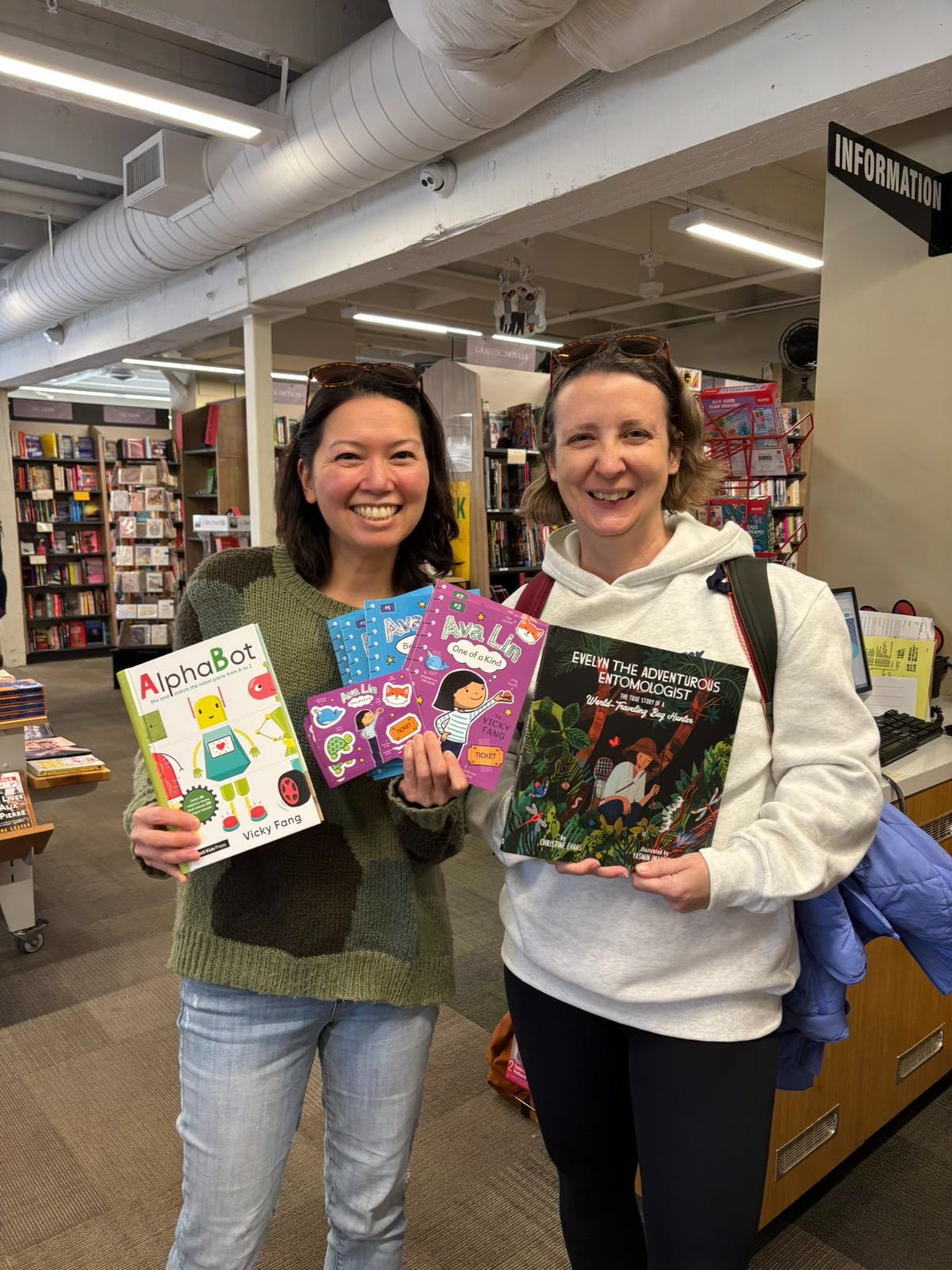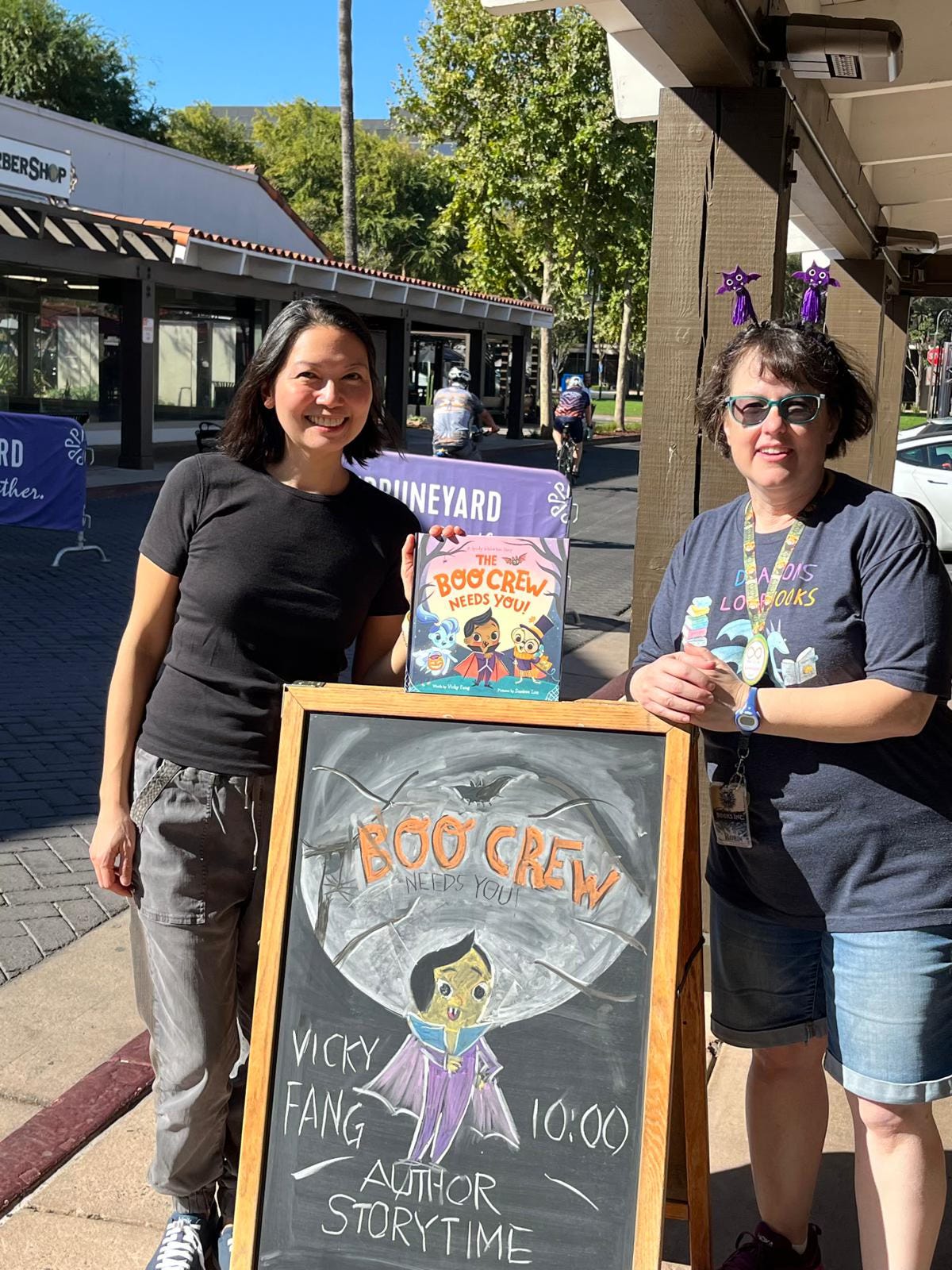I first met Robin Stern of Books Inc. Campbell when I was getting ready to launch Evelyn the Adventurous Entomologist in 2019. I think a friend introduced me (which is always a great way to get talking to bookstore peeps if you’re nervous like me) and I knew Robin would be a wonderful person to work with. Over five years later, Robin still always has a copy of Evelyn on hand to sell and I happily sign it whenever I visit. I wonder how many copies she’s personally sold over the years!

I asked Robin some questions about how authors can work with bookstores, how books get ordered for the store, and how the dreaded returns process works. If you have any further questions, leave them in the comments.
Christine: How do you decide which books to stock in the store?
Robin: I’m the restock buyer, so mostly I’m reordering what has been ordered as frontlist1 by the head buyer in San Leandro. But if I hear murmurings from customers, or see something I like on an email from a rep or social media I’m able to bring in what I want with some restrictions: it has already been published, it’s a major publisher, and I think sales will justify my bringing it in. Consignments2 are of course another ball of wax. I can go into that if you’d like, but I do consignments despite their being a big pain in the butt because I like to give shelf space to local authors for community-building purposes.
C: Returns is a sticky subject for authors! What factors in to the decision to return books to the publisher?
R: Books Inc has two major return schedules every year, plus we try to return to each major publisher monthly as needed. I look at sales from the last year, and if there has been no sale in 6 months or so, I most likely return it. Not if I think there is a seasonal demand, or a new movie coming out or something. We also have to look at the condition books are in as we’re shelving and return shelf-worn stuff.
C: And conversely, what makes you reorder a book time and time again so you always have it in stock?
R: I’m looking for consistent sales. So every day I scan through the previous day’s sales and reorder as necessary. If there haven’t been sales in the last 6 months (or if it’s a hardcover that will be in paperback relatively soon), I’ll mark it as DNR (do not reorder).
C: What can authors do to help booksellers and local independent bookstores?
R: Our authors are pretty fabulous (I’m such a suckup!) but in general, coming into the store with an understanding of publishing (so I don’t have to explain what Ingram3 is, for instance) and bookselling (yeah, coming into the store two days before Christmas wanting to chat about your book is really tone deaf…I had to ask several local authors to email me back in the new year because I was having trouble being polite) is great. In terms of promotion, mentioning your local indie on social media is wonderful. Mentioning Amazon first on your website or social media, not so wonderful. Honestly, most traditionally-published authors understand all this. My main issue is with self-published authors.
C: What do you wish authors understood about bookstores?
R: That a $40 picture book is not going to sell! Lol. That we have to justify the shelf space for every book in the store (again, I’m pretty lenient with this one in order to foster community). That we are for the most part paid minimum wage, so do not call my cell phone to chat about your book (I had to start adding “for emergencies only” to my email signature listing my number because this self-pub author kept calling me! Hell no, I’m not paid for that).
C: If a debut author wants to introduce themselves to their local bookstore, what should they do?
R: Coming in during a quiet period is fine, but be prepared to be given my email address if I’m not here. It’s fine to leave a sample copy and promo material (preferably not screaming the A*zn word on promo material). Actually, do not mention them at all. I’ve gently corrected so many authors on this. An email is totally fine, though, and should include info about themselves, the book and how they’re marketing it.
C: Any favorite memories of bookselling that you’d like to share?
R: One of my most favorite memories is actually a continuing one. You may have met Art Hand, an 80-year-old regular customer, and every time he’s in he looks for a small child to gift “the essential McCloskeys” to (Make Way for Ducklings and Blueberries for Sal). He chats with them, gets to know the kid, gives the family his card, and knows he will be remembered. It makes me smile every time. And he’s done it over 80 times!
C: I love that story—it shows the importance and impact of local bookstores in the community. Thank you for answering my questions, Robin!
Wherever you live, you can buy books online from Books Inc. or any other independent bookstore. Call in to see your local bookseller, buy books, tell your friends, and keep your local bookstores open.
Frontlist books are those newly released by the publisher. Backlist are older books still available from the publisher.
Robin is talking about stocking books by self-published creators where you receive a certain percentage of the sale if the book sells.
Ingram distributes books for publishers. https://www.ingramcontent.com







Thank you, Robin, for sharing your insights!
Wow - I'd love to see a profile on Art Hand, the generous giver of McCloskey books!
Lovely post!